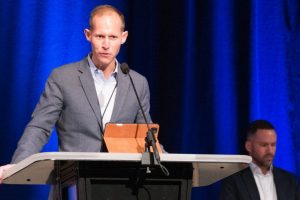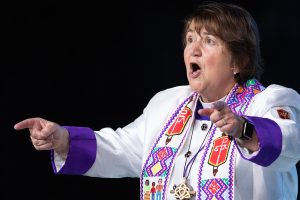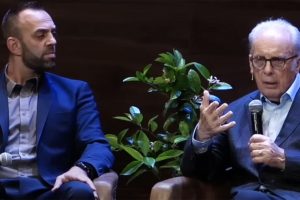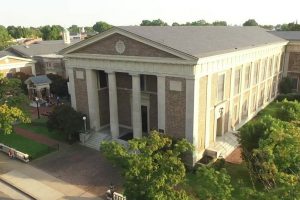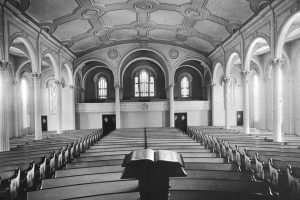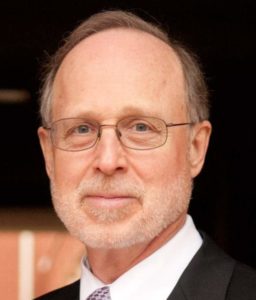 My earliest recollections of Louisville, Kentucky, are pretty grim. All the dorm rooms were taken when Kent Weir and I arrived at Southern Baptist Theological Seminary in August 1975. Our penance for failing to plan ahead consisted of working our way down the rooms-for-rent list that was handed us. The rooms were located in the grimier quarters of a strange city, each more depressing than the last.
My earliest recollections of Louisville, Kentucky, are pretty grim. All the dorm rooms were taken when Kent Weir and I arrived at Southern Baptist Theological Seminary in August 1975. Our penance for failing to plan ahead consisted of working our way down the rooms-for-rent list that was handed us. The rooms were located in the grimier quarters of a strange city, each more depressing than the last.
Like Kent’s 1965 Valiant, none of the rooms were air conditioned. Louisville in August was hotter, stickier and smellier than anything I had ever imagined. Could this be a sneak preview of hell?
Late that afternoon, teetering on the verge of panic, we learned that the Presbyterian Seminary, located just down the road from SBTS, had opened an entire dormitory floor for improvident Baptist seminarians. I had never needed air conditioning before; now I wondered how Southerners ever survived without it.
I had settled on Southern Seminary for three reasons. My pastor in Edmonton, Alberta, who graduated in the 1960s, spoke of his alma mater in reverential tones. Several of my friends from university and Bible school days had enrolled. And, most importantly, tuition was underwritten by the Southern Baptist Convention so it was dirt cheap.
On our second day in Louisville I attended a welcome reception on the library steps. Harold Songer, an administrator with a background in New Testament, told us two things: not every class is worth an A, and “if you are to be crucified as a pastor, make sure it isn’t on a toothpick.” There was something ominous about that second remark, but I wasn’t sure what it was. In the fullness of time I would be enlightened.
Every year, the seminary paid modest stipends to “Summer Missionaries” willing to serve as foot soldiers in the vast denominational offensive against the devil. When classes resumed in August, the current crop would parade across the chapel stage delivering 20-second synopses of their labors for the Lord.
A few days after arriving in Louisville I heard an earnest seminarian deliver a peculiarly Southern Baptist boast: “I spent my summer at Glorietta Baptist Camp,” he said. “We had 635 campers and 467 first-time decisions for Christ.” Wild applause ensued. A simple “recommitment” might nudge a camper closer to “full-time Christian service,” but a first-time decision saved the kid from an eternity in hell.
Thank you, James Kennedy
Everyone was talking evangelism in the mid-1970s. Bill Bright had his Four Spiritual Laws and James Kennedy, pastor of Coral Ridge Presbyterian Church in Florida, had a program called Evangelism Explosion (EE for short). Ironically, I have Dr. Kennedy to thank for introducing me, indirectly, to the woman who has been the “bone of my bones” for 40 years.
There must have been a dozen Canadian students at Southern and we all hung out together at every opportunity. Several of us were attending Calvin Presbyterian, a moderately conservative congregation in an affluent Louisville suburb. The church had an active college and career group that I attended when I wasn’t too busy studying.
One fateful evening, Cal Malena, one of my Canadian housemates, told me I had missed seeing something big. A young woman had made the associate pastor look like a complete idiot.
The cleric in question was a recent arrival from Coral Ridge Presbyterian and a self-acknowledged master of the Evangelism Explosion approach to soul-winning. On the evening in question he got the ball rolling with what EE called a “diagnostic question”: “Have you reached the point in your spiritual life where you know for certain that if you were to die tonight you would go to heaven?”

This photo was taken at the home of Nancy’s parents, Charles and Patricia Kiker, in Louisville, Kentucky, shortly after Nancy and I met.
Everyone immediately raised their hands with the exception of one young woman no one had seen before. “I had been reading Kierkegaard,” she explained years later, “and I wasn’t certain about anything. I had an existential hope of something beyond death, but that wasn’t what he was looking for.”
The evangelism expert summoned his guinea pig to the front of the room so he could explain the gospel in terms so simple only a fool could grasp it. “You see, God is like a gigantic book,” he began, “and you’re like a tiny little book. And Jesus is like a medium-sized book that brings you and God together.” The response came without hesitation: “That’s the stupidest thing I’ve ever heard.”
As I listened to Cal’s story, I felt an overwhelming desire to meet this woman. A few days later, I spotted the redheaded stranger at a Halloween party where she was talking to an old friend from her University of Kentucky days. She was wearing a broom dress her mother had made back in the 1950s, and her auburn hair hung to her waist in two long braids.
“This is Nancy Kiker,” our mutual friend said. “Pleased to meet you,” I replied. “Will you marry me?”
“Yes,” she said. A little over a year later, we were married in the chapel of Crescent Hill Baptist Church in Louisville.
Carrot-and-stick evangelism
During revival week, at church camp and sometimes even in Sunday morning worship, the predominant Southern Baptist approach to evangelism was more direct than either EE or the Four Spiritual Laws. It was all about hell and how to make sure you didn’t go there. The technique consisted of a stick (only a “decision for Christ” can save you from perdition) and a carrot popularly known as “once saved, always saved.” Once you walked the aisle, or raised your hand with every eye closed and every head bowed, no power on earth (not even a life of crime, violence and debauchery) could deprive you of your ticket to heaven. Who could resist a deal like that?
This carrot-and-stick evangelistic strategy was perfectly suited to a denomination that was born defending slavery, that came of age in a season of Jim Crow segregation, and that had spent the previous 20 years dismissing the civil rights movement as a communist plot. If the Southern Baptist hell was real, evangelism must be the first and only mission of the church.
The Southern Baptist hell brooked no rival. Feeding the hungry and visiting the sick might help to bait the evangelistic hook, but as stand-alone activities they were considered illegitimate. If a man is bound for hell, the reasoning went, what does it matter if he hears words of comfort in his sorrow or enjoys a square meal at the church’s expense? He still winds up in hell. Which is why evangelism, defined as snatching brands from the burning (Jude 1:23), can be the only worthy task of the church.
In 2006, Paige Patterson explained the motivation behind “the conservative resurgence” he famously led. It was the fear that “the continued drift of the Southern Baptist Convention could spell eternal doom for hundreds of thousands of people” that got the fight started and kept it going, he said. Believing “that heaven and hell are the only destinies and that everyone alive will spend eternity in one or the other, and further that Jesus and His atoning death provides the only way to avoid hell and inherit heaven” made the fight for the soul of the SBC vital and unavoidable. Patterson was convinced he would fail, but visions of the hellfire urged him on.
“Patterson’s ‘two destinies doctrine’ was ignored by my professors because it wasn’t in the Bible.”
This “two destinies doctrine” would eventually transform (some would say “deform”) the seminary I entered in 1975. SBTS professors weren’t just preaching error, they were sending themselves and their students to an eternity of conscious torment. And what of the countless thousands of men and women, boys and girls, who would never make a decision for Christ because their SBTS-trained preacher didn’t believe in that kind of thing?
Strategically, this was a powerful argument; theologically, it was bankrupt. SBTS professors talked about hell the way the Bible talks about hell. The Old Testament, they said, knows nothing of heaven or hell. With the sole exception of Daniel, the prophets speak of a divine judgment that comes in this world, not the next.
Jesus frequently warned of Gehenna “where the worm dieth not, and the fire is not quenched,” but a deficient theology didn’t land you in Gehenna; oppressing vulnerable people did. Patterson’s “two destinies doctrine” was ignored by my professors because it wasn’t in the Bible. The Bible warns that the consequences, temporal and eternal, of grinding the face of the poor will be dire, but sorting out the details is above our pay grade.
Profs under fire
The professors who made the deepest impression on my young mind (Frank Stagg, Frank Tupper, Bill Leonard, Glen Stassen and Paul Simmons) had a passionate love for the Southern Baptist culture in which they were raised, but they no longer believed in carrot-and-stick evangelism or the “two destinies doctrine” that made it run. In fact, they saw the Southern Baptist hell as an excuse for avoiding a serious conversation about issues desperately in need of a genuinely Christian perspective, including war and peace, race and gender, economic justice and environmental catastrophe.
These were the issues men like Frank Stagg and women like Molly Marshall wanted to talk about in 1975. The Bible had so much wisdom to impart, but all they (and we) were supposed to talk about were the implications of a Southern Baptist hell. The leading lights of Southern Seminary couldn’t critique the Southern Baptist hell in print or from the lectern. My professors’ worst nightmare was picking up a denominational newspaper and reading, “Critics accuse Professor X of universalism.”
No one wanted to be crucified on that particular toothpick.
While I was a student in the late 1970s, the subject of hell never came up in class unless Bill Leonard was discussing Jonathan Edwards’ infamous sermon, “Sinners in the hands of an angry God.” My professors couldn’t talk about the Southern Baptist hell, while their critics spoke of little else. It was never a fair fight.
“Southern Baptists, moderate or fundamentalist, were committed to evangelism; the fight was over whose evangel would win.”
Southern Baptists, moderate or fundamentalist, were committed to evangelism; the fight was over whose evangel would win. Most of the professors at Southern interpreted the good news in terms of the Kingdom of God Jesus proclaimed. God was bringing a divided world together through the cross of Christ: Jew and Gentile, slave and free, male and female. Stagg was in love with 2 Corinthians 5:19: “God was in Christ reconciling the world to himself, and has given us the ministry of reconciliation.”
That was the gospel I learned in seminary.
Preaching hell
SBC hardline conservative looked to the frontier fervor of the Second Great Awakening for their definition of “gospel.” Instead of engaging the flesh-and-blood needs of this world, these men used the hyperbolic language of spiritual warfare to conjure over-the-top visions of a spirit world which, though invisible to the naked eye, was the only reality that mattered.
After being elected SBC president in 1979, Adrian Rogers laid out his agenda. “My aim as president of the Southern Baptist Convention is revival – real revival – heaven-sent, God-breathed, Holy Ghost, mountain-moving, earth-shaking, Devil-defying revival.”
And that meant preaching hell. In a famous sermon from that period Rogers left nothing to the imagination. “The missing message in today’s church and especially on the air waves is the message concerning hell. And I believe that we’re reaping the benefits of failing to bring that message. I believe the reason we have so much, so-called hell in our world is because we have so little in our pulpits.”
Later that year, W.A. Criswell, pastor of First Baptist Church, Dallas, and televangelist James Robison organized a Heart of America revival tour that made a key stop in Southern Seminary’s capacious chapel. “We’re producing too many academicians, philosophers, speculators, humanists, counselors,” Criswell proclaimed, “not the flaming evangelists there used to be.”
Men like Criswell, Rogers and Robison were caught up in a can-you-top-this competition that was bound to end badly. The day following Criswell’s screed against godless intellectuals, Robison shared a hideous vision God had given him that ended with the visual of his family nailed to the wall of his Dallas home. Under the crucified corpses of his wife and children God had had scrawled these words in the blood of the innocent: “Is that good enough for you, James?” The moral, presumably, was that God wanted Robison to recommit to his first love: a hellfire evangelism powerful enough to bust sinners out of Baptist hell.
This insidious species of religious escapism was valued precisely because it was untethered from actual human suffering. I found myself wondering what men like Criswell and Rogers made of Robison’s bizarre rant. What kind of God, after all, would inspire such a twisted specter? The same God who casts Jews, Buddhists, Hindus, Muslims (and, until recently, even Mormons) into the Lake of Fire for subscribing to the wrong religion.
Whatever I might think, a generation of Southern Baptists raised on hell-fire revivalism largely embraced the feverish preaching of hardline Baptist preachers. The more over-the-top the better. Precisely because they were untethered from actual human suffering, these sermons over the years unleashed a demonic power that “academicians, philosophers, speculators, humanists and counselors” could never match.













